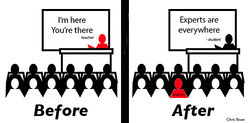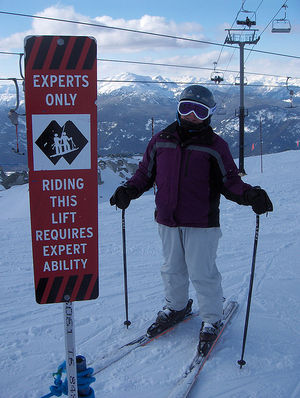Expert learners
| Learning and Teaching in Practice | |
|---|---|
| Module 1: Learner characteristics | |
| Knowing the Learner | Introduction | Learning Preferences | Literacy and numeracy | Prior Learning | Expert learners | Summary |
What is meant by the concept of the expert learner? How does a novice learner differ from that of an expert? These are important questions for us to explore if we as teachers are to understand how to design learning experiences and environments to develop the expert learner. Have you wondered why some students can confidently tackle the subjects they study and succeed? How do they do this? The concept of an expert learner is not new.
According to Ertmer and Newby (1996), the expert learner is: "strategic, self-regulated, and reflective" (p. 3). Expert learners know 'how to learn' and how to consistently achieve their goals to succeed.
Contents
Characteristics of the expert learner
Expert learners are considered to have three main characteristics (Wild & Heck, 2011).
They are known to:
- actively engage - participate to develop knowledge and understanding;
- take responsibility - take charge;
- practice self-regulated learning - plan, monitor and evaluate own learning.
|
Explore what it takes to be an expert learner
|

Developing the expert learner
Do you believe that all teachers are already experts? Or do you believe that before teachers can guide students to develop skills as expert learners, they too must become proficient as learners? Can experts potentially be found anywhere? Find out if you have some of these specific characteristics of an expert and independent learner?
How can you develop as an expert learner?
|
References
- Ertmer, P. & Newby, T. (1996). The expert learner: Strategic, self-regulated, and reflective. Instructional Science 24(1), 1-24. (Available on Moodle.)
- Wild, M. & Heck, J.(2011). Expert learners. ID 4 the Web.


